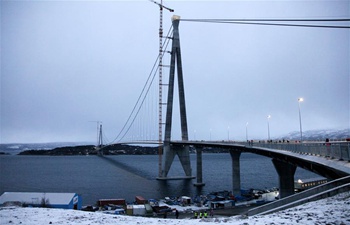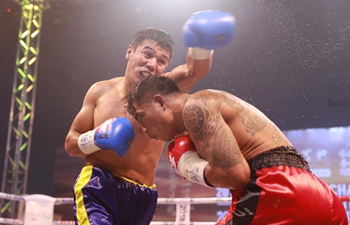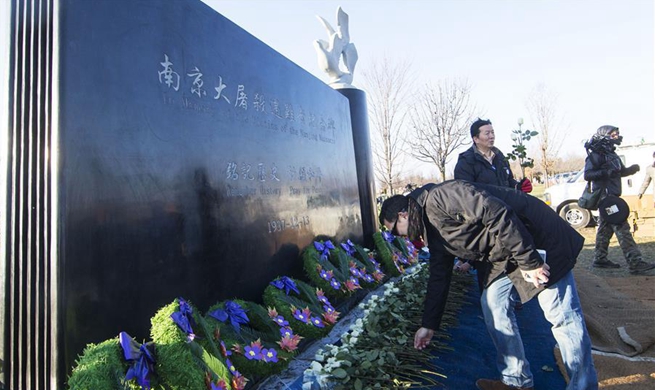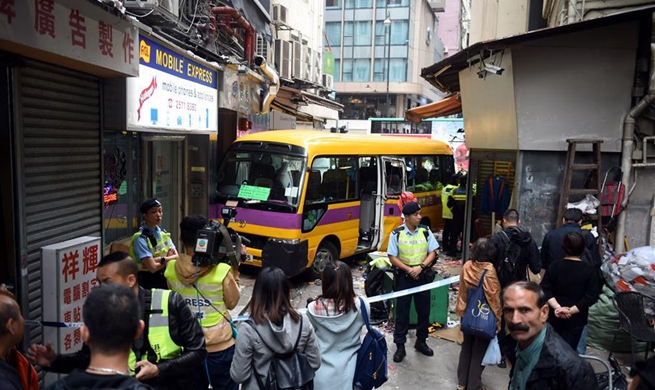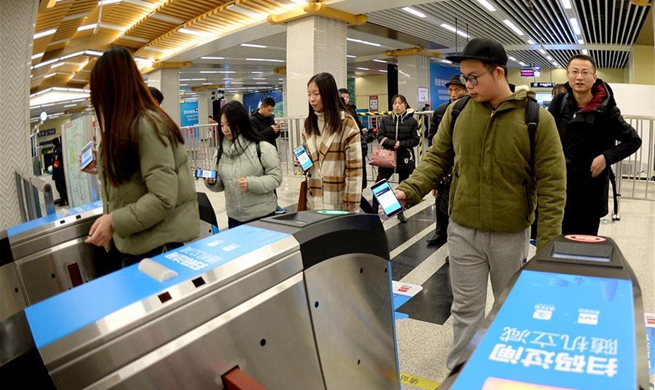TOKYO, Dec. 10 (Xinhua) -- Former Nissan Motor Co. Chairman Carlos Ghosn was served with a fresh arrest warrant on Monday for allegedly concealing a further 4.2 billion yen (37.3 million U.S. dollars) from the company's securities reports for the three business years through March 2017.
Tokyo prosecutors also indicted Ghosn, Greg Kelly, a former representative director of Nissan, and Nissan as a company, on charges of violating Japan's financial instruments law when misstatements were made in the company's releases to the market during the five years through March 2015.
"Making false disclosures in annual securities reports greatly harms the integrity of Nissan's public disclosures in the securities markets, and the company expresses its deepest regret," Nissan said in a statement on the matter, adding that it will endeavor to strengthen its corporate governance.
Ghosn and Kelly may be slapped with an addition 20 days of detention in Tokyo through Dec. 30, sources close to the matter said Monday, without the access to lawyers or embassy officials being guaranteed.
Japanese law stipulates that the limit a suspect can be held without charge is 23 days if an arrest warrant was issued by police and 22 days if it was issued by prosecutors.
In theory, as new charges and fresh warrants are served, as long as they are approved by a court, a suspect can be held in detention in Japan indefinitely.
Ghosn, 64, was initially arrested by prosecutors on Nov. 19 on a charge of violating a financial law by understating his earnings in financial reports for the five fiscal years from fiscal 2010.
While Ghosn is suspected of having concealed around 9 billion yen of his pay, Ghosn, Kelly and Nissan were slapped with a criminal complaint by Japan's securities watchdog for the more than 5 billion yen of under-reporting.
Ghosn has admitted to the Tokyo prosecutors his remuneration was not fully reported in the securities reports to be submitted to Japanese regulators.
He has maintained, however, that the reports were not intentionally doctored, sources close to the investigation said, and claimed he did not have to report some of his earnings on payments that have yet to be settled.
Meanwhile, Nissan has rejected a request by Renault, its top shareholder in a three-way alliance, which also includes Mitsubishi Motors, to send a replacement for Ghosn from the French firm, on grounds that Nissans management structure needs to be reviewed in light of possible abuses of overly centralized power at the firm, sources has said.
Nissan CEO Hiroto Saikawa said he believes that an excessive concentration of power in Ghosn, while he was at the helm of the Yokohama-based automaker, had led to a lack of transparency at the firm and cast aspersions over corporate governance there.
Saikawa, a tussle continues between Nissan and Renault for leadership, sees the Japanese automaker's current relationship with Renault as favoring the French side, as Renault owns a 43.4 percent stake in Nissan, with Nissan in turn holding only a 15 percent stake in its French partner.
Nissan has no voting rights as far as Renault is concerned, although owns a 34 percent stake in Mitsubishi Motors Corp. who has along with Nissan ousted Ghosn as its chairman.
While Saikawa wants Nissan's management structure to be reviewed, three-way talks are being held by the alliance as to its future, in contrast to Ghosn's previous unilateral decision making process.
But under a current pact made between Nissan and Renault, the position of CEO and chairman of the alliance is to be held by someone from Renault.
The French government, as the firm's largest shareholder, also has a vested interest in ensuring Ghosn's replacement comes from Renault and has become more vocal on this point of late, sources said recently.
As talks continue between the alliance, three independent directors from Nissan's board have set up a panel to decide who should replace Ghosn, Nissan said.
At a meeting slated for Dec. 17, the board is expected to approve Ghosn's successor, with sources saying that Saikawa may double as temporary chairman.
Prior to that, it has been decided by top executives of Nissan, Renault and Mitsubishi Motors that all three would be "fully committed" to the alliance and that it will, ostensibly, be led by the three companies' leaders, instead of one specific figure as had been the case, and indeed the problem, with Ghosn.



